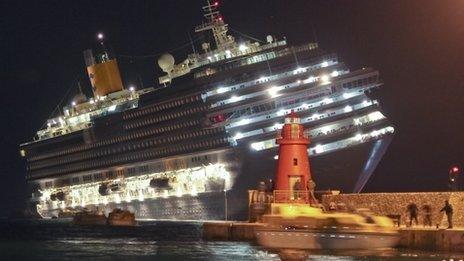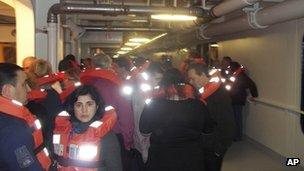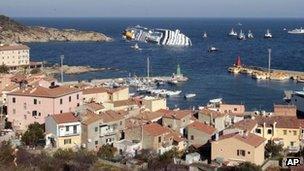Costa Concordia: Giglio official 'never saw Schettino'
- Published

As the Costa Concordia was sinking, the deputy mayor of the Tuscan island of Giglio, Mario Pellegrini, went on board to join the rescue effort. He told Outlook on the BBC World Service how he reacted when he realised the ship was in trouble.
"I met the mayor and immediately we devised a plan to co-ordinate the evacuation of the people, so I decided to go on a tender and to go on board. My first duty was to look for an officer on the boat in order to co-ordinate the evacuation.
I took the first tender that arrived at the port with the first evacuated passengers. I took this tender all by myself and went on board. I went up and I started looking for an officer.
After 20 minutes I couldn't find anybody. I even went on the higher bridges of the ship and even then I couldn't see anybody.
So I decided to go down again to co-ordinate people and put them in dinghies in order to go on land. At the time the ship was not listing so it wasn't difficult.
There were a lot of people who wanted to help but there was no-one guiding them; there was nobody was directing anything.
There was goodwill by many people but many didn't even speak English, so it was difficult.
People fighting
At the beginning there wasn't much panic, just a lot of confusion. People didn't know what to do but there was no real fear.
Then I went on the right-hand side of the ship and it started tilting towards the sea. Big parts of the ship were going underwater - then panic erupted, people really were scared.

Mr Pellegrini arrived on the ship at 23:00 and was there for more than six hours
When the boat started listing, all the corridors filled with water. They were like wells and there was a lot of people stuck in these wells.
Using a rope, I started to pull people up. They were crying and were really scared.
It was a purser of the ship who was helping me and we rescued about nine people. Some of them were quite old; some of them were children.
People were fighting with each other in order to get on the rope to climb up. I can't condemn them because the situation was really bad. It was really dramatic.
The doctor also helped me; he was very good and courageous. Then, on the bridge, I came across the only officer I could find. He was young, a second-class officer.
He found a little stepladder to put on the side of the boat which people could climb down.
We were together shoulder to shoulder until 05:30 in the morning. I have to say this young officer was wonderful.
He hadn't been given any orders; he was just following his own orders.
It was very difficult as there was some oil around, so climbing down the steps and on to the ladder was extremely slippery. For children and old people, it was especially difficult.
This officer was very good but he was the only officer I met.

Giglio is a small island with a population of less than 1,500
Finger by finger
While I was pulling people out of the upended corridor, one girl started shouting and pulling and we had to take her out by her feet.
A lot of the old people attached themselves to anything they could find and they didn't want to let go so we had to go down and detach them finger by finger.
There was one mother who was holding a baby. I said, 'Give me the child and I will put him on board the dinghy and then I will give you him back'. But the mother didn't want to, she was panicking and wouldn't let go of the baby. It was very difficult to get the baby from her.
There were some good moments too. There was an old woman crying and I went over and hugged her and she was reassured.
The last person we took out was an Asian girl who had a broken leg.
I was afraid that the ship might go under while I was working on it.
By the time I left the ship, I was literally exhausted. In the last moments, when the dinghy down at the sea was full of professional rescuers, I was on the part of the bridge where I had been for quite a long time, holding old people, babies and so on.
Because I was so tired and wasn't concentrating, I fell down and nearly broke my neck.
I never saw the captain; the only officer I saw was the young officer, a boy really. I didn't see anyone else."
Listen to the full interview here. More from Outlook on the BBC World Service.